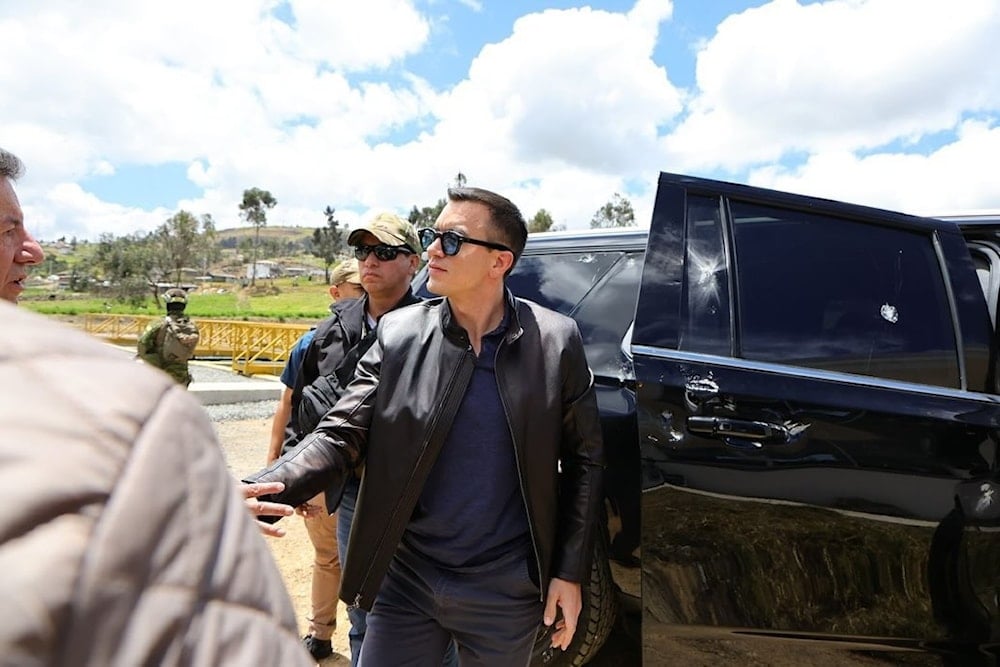Ecuador Noboa's motorcade comes under rock-throwing attack, 5 detained
Ecuadorian President Daniel Noboa has survived what authorities called an assassination attempt during nationwide unrest sparked by his decision to end decades-old fuel subsidies.
-

Ecuadorian President Daniel Noboa stands beside his damaged vehicle after surviving an apparent assassination attempt during protests over the government’s decision to end fuel subsidies in Cañar province on October 7, 2025 (X @MinLoffredoEc)
Ecuadorian President Daniel Noboa escaped unharmed on Tuesday after his convoy came under attack during violent protests over his government's decision to abolish fuel subsidies, a reform that has ignited weeks of nationwide demonstrations. Authorities described the incident as an assassination attempt, underscoring the growing volatility surrounding Noboa's economic agenda.
Environment and Energy Minister Ines Manzano reported that Noboa's vehicle showed signs of bullet damage after being struck by rocks and other projectiles hurled by a crowd of roughly 500 people in the southern province of Cañar. She said five individuals were arrested and accused of terrorism and attempted assassination. "Shooting at the president's car, throwing stones, damaging state property — that's just criminal," Manzano declared. "We will not allow this."
Speaking later at a student gathering in Cuenca, about 77 kilometers from the site of the attack, Noboa urged restraint while vowing not to back down. "Do not follow the bad example of those who wanted to stop us from attending this event with you and who tried to attack us," he said. "Such attacks will not be accepted in the new Ecuador and the law applies to everyone."
Subsidy uprising
The assault comes amid mounting social unrest triggered by Noboa's decision in mid-September to scrap diesel subsidies that have existed for decades as a key cost-of-living buffer. The move, which raised diesel prices from about $1.80 to $2.80 per gallon, was framed by the government as a fiscal reform that would save $1.1 billion annually. Noboa pledged that the savings would be redirected to support small farmers and transport workers, arguing that the subsidies had long benefited wealthier consumers and fueled corruption, smuggling, and inefficiency.
However, opponents say the measure threatens to deepen inequality in a country already reeling from inflation and unemployment. The national Indigenous federation CONAIE, which launched a strike and road blockades more than two weeks ago, accuses the government of ignoring the social cost of its reforms. The group said police responded with "brutal military and police action" and shared footage on social media showing an elderly Indigenous woman in traditional dress being detained by masked officers. "At least five of us have been arbitrarily detained," CONAIE said in a statement posted on X.
Crisis revival
Fuel subsidies have been a political flashpoint in Ecuador since the 1970s, when they were introduced to shield consumers from volatile oil prices and support rural livelihoods. While successive governments have acknowledged the subsidies' fiscal burden, costing billions annually, past attempts to remove them, including in 2019, have led to massive uprisings that paralyzed the country and forced leaders to reverse course.
In response to the latest unrest, Noboa has declared states of emergency in several provinces, authorizing the military to maintain order. The 37-year-old president, who was reelected in April, has made security and fiscal discipline central pillars of his administration, often relying on emergency powers to confront what he describes as the dual challenges of economic instability and organized crime.
Fragile reforms
Defense Minister Gian Carlo Loffredo shared a photo of Noboa standing beside his damaged vehicle, praising his resilience. "Nothing stops this president, which is the best sign that the country won't be stopped either," he wrote. Images released by the presidency showed shattered windows and a heavily cracked windshield, while video footage captured protesters pelting the convoy with rocks along the roadside.
A este Presidente nada lo detiene, esa es la mejor señal de que al país tampoco lo detendrán. @DanielNoboaOk pic.twitter.com/W6SMkwNWFf
— Gian Carlo Loffredo (@MinLoffredoEc) October 7, 2025
The attack drew condemnation from several Latin American governments, including Costa Rica, Honduras, and Panama, which expressed solidarity with Noboa and denounced political violence.
That same evening, about 200 demonstrators gathered in Quito to protest against the government's austerity measures. The march remained mostly peaceful before being dispersed by police. The events underscore the fragility of Ecuador's political climate as Noboa pushes ahead with reforms aimed at stabilizing public finances, but which risk alienating the very sectors most affected by rising living costs.
Read more: US bases in Ecuador spark sovereignty debate under Noboa presidency

 4 Min Read
4 Min Read










